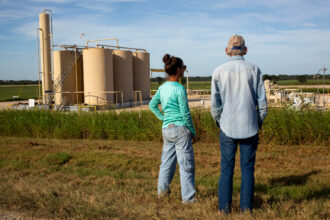Under pressure from investors and the public, more of the world’s largest companies are sharing information about deforestation in their supply chains, according to a new report released Monday.
According to CDP—a London-based organization that collects companies’ climate-related disclosures—more corporations are releasing information about the impacts of deforestation, a trend that could ultimately result in lower greenhouse gas emissions. Deforestation, research shows, contributes about 15 percent of global emissions each year, the same amount released by all forms of transportation.
Every year, CDP asks more than 800 of the world’s largest, forest-dependent companies to voluntarily disclose information about deforestation in their supply chains. This year 21 percent, or 201, of them did, compared to 180 last year. Notably, two of the world’s biggest commodity companies—Archer Daniels Midland (ADM) and Bunge—responded to CDP’s request for the first time.
“We’re seeing the numbers grow every year,” said Katie McCoy, head of CDP’s forest program. “We’re in an age where people are asking companies to be more transparent and there’s increasing scrutiny from investors.”
CDP generated the report at the request of 365 investment firms, representing more than $22 trillion in assets, that wanted to know how companies are managing deforestation risks from the four primary forest-destroying commodities: palm, timber, soy and cattle. The corporations that responded to CDP range across industries, including textiles, cosmetics, food retail, agriculture and media.
Investors, lenders and regulators are increasingly asking companies to report on how they will manage climate risks, pushing for greater transparency in commodity supply chains—something many companies have been historically reluctant to do. Now, though, they’re being pushed.
Next week, the Task Force on Climate-Related Financial Disclosures, chaired by former New York Mayor Michael Bloomberg, is set to issue its first report, with recommendations on how global companies should disclose climate-related risk.
CDP and other groups are also stressing to corporations that they’ll face shaky futures if they don’t address deforestation.
The companies that responded to CDP this year said that, on average, 24 percent of their revenues depended on the four biggest forest-risk commodities. CDP calculated that deforestation risk jeopardizes as much as $906 billion in investment turnover a year.
Most of the companies—72 percent—said they were confident they had adequate supplies of those commodities. But CDP said that figure reflected an overly rosy outlook. More than 80 percent of agricultural companies, for example, have already had to adapt to deforestation risk or take revenue hits because of it, CDP found.
“That confidence may be misplaced, given the data we’ve analyzed,” McCoy said. “Eighty percent of agricultural producers have already felt an impact.”
Meanwhile, CDP found, only one out of five companies had assessed deforestation risks beyond a six-year horizon, and fewer than half had looked at how the availability of commodities could impact their future growth.
With the growing awareness of the damaging impacts of palm oil production, consumers began to demand products without palm oil in the marketplace. That forced manufacturers and retailers to seek out certifications or on-package verifications that goods were produced without deforestation or sustainably. Increasingly, though to a lesser extent, they’re starting to demand that for the other forest-damaging commodities.
Now the world’s biggest commodity companies—ADM, Bunge, Cargill and Louis Dreyfus, collectively known as the ABCD companies—are feeling the push for transparency more strongly than ever.
The four companies control as much as 90 percent of the world’s grain trade and wield enormous influence up and down the supply chain, providing the raw materials that end up in a vast array of consumer products.
Cargill, the world’s largest privately held company, began disclosing information to CDP in 2014. ADM and Bunge did so this year, in response to shareholder resolutions that asked the companies to report on their progress toward deforestation goals.
But the increasing transparency and disclosure has yet to translate into meaningful reductions in deforestation. The Brazilian government said last week that deforestation in the Amazon rainforest grew by 30 percent over the past year. Climate scientists say that preserving the Amazon, which absorbs 2.2 billion tons of carbon dioxide a year, is a key tool for controlling climate change. Similar deforestation rates have continued in other critical forest areas of south Asia, including Indonesia and Malaysia.
Many predict the pressure will continue to mount, especially as targets for reducing greenhouse gas emissions under the Paris Agreement loom. According to CDP and We Mean Business, a coalition working to transition companies to low-carbon operations, businesses could cut nearly 10 percent of global greenhouse gas emissions by 2030, 10 percent, or as much as 1.2 billion metric tons, by reducing deforestation.
About This Story
Perhaps you noticed: This story, like all the news we publish, is free to read. That’s because Inside Climate News is a 501c3 nonprofit organization. We do not charge a subscription fee, lock our news behind a paywall, or clutter our website with ads. We make our news on climate and the environment freely available to you and anyone who wants it.
That’s not all. We also share our news for free with scores of other media organizations around the country. Many of them can’t afford to do environmental journalism of their own. We’ve built bureaus from coast to coast to report local stories, collaborate with local newsrooms and co-publish articles so that this vital work is shared as widely as possible.
Two of us launched ICN in 2007. Six years later we earned a Pulitzer Prize for National Reporting, and now we run the oldest and largest dedicated climate newsroom in the nation. We tell the story in all its complexity. We hold polluters accountable. We expose environmental injustice. We debunk misinformation. We scrutinize solutions and inspire action.
Donations from readers like you fund every aspect of what we do. If you don’t already, will you support our ongoing work, our reporting on the biggest crisis facing our planet, and help us reach even more readers in more places?
Please take a moment to make a tax-deductible donation. Every one of them makes a difference.
Thank you,











